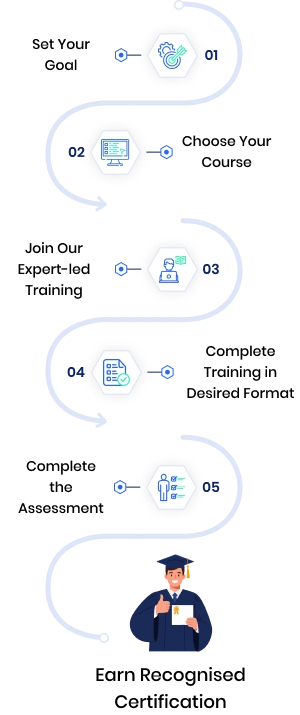Course Overview O v e r v i e w
- Course Overview
- Course Outline
- What’s Included
- What You’ll Learn
- Exam Details
Praxis Framework™ Foundation Overview
The Praxis Framework™ Foundation Course provides learners with an in-depth understanding of the fundamental principles and terminology of the Praxis Framework™. It explains how to integrate knowledge, methodology, and competence into an effective management approach.
Formal training enables learners to understand governance structures, management processes, and best practices for successful project and programme delivery. It also prepares learners for the Praxis Framework™ Foundation exam, establishing a solid foundation for progression to Practitioner level.
At Training Deals, we offer Praxis Framework™ Foundation Training that is practical, interactive, and aligned with industry standards. Our expert trainers deliver engaging sessions with real-world examples. With affordable pricing and dedicated learner support, we help you build a strong foundation in integrated project management.

Praxis Framework™ Foundation Outline
Module 1: Introduction to Praxis
Value of ‘Free’
Discontinuous Mind
Praxis Context
Goals of P3 Management
Central Elements of Both Project and Programme Management
Typical Characteristics of Programme Management
Core Elements of Portfolio Management
Commonly Identified Areas of Complexity for Projects and Programmes
Time to Drop Quality
Expansion of the Triple Constraint within the Praxis Method
Module 2: Life Cycle Management
Goals of Life Cycle Management
P3 Life Cycle Phases and Governance Mechanisms
Typical Serial Project Life Cycle
Parallel Project Life Cycle
Parallel Project Iteration
Typical Programme Life Cycle
Typical Portfolio Life Cycle
Module 3: Agile Project
Characteristics of an Agile Project and its Relationship with the Triple Constraint
Scrum Development Process Used in Agile Projects
Praxis and DSDM Agile
Goals of Sponsorship
Characteristics of a Sponsor
Module 4: Knowledge and Maturity Management
Goals of Knowledge Management
Establishing Knowledge Management
Goals of Capability and Maturity Management
CMMI Capability and Maturity Levels
Praxis and Other P3 Guidance
Praxis Delivery Functions
Module 5: Integrative and Organisation Management
Integrative Management Functions
Principles, Goals, and Procedures of Organisation Management
Organisation Management – Levels
Standard Project Structure
Programme Structure
Organisation Management Plan
Module 6: Stakeholder Management
Principles, Goals, and Procedures of Stakeholder Management
Stakeholder Map
Stakeholder Management Plan
Stakeholder Register
Principles and Goals of Business Case Management
Business Case
Justification
Module 7: Planning
Principles and Goals of Planning
Management Plans
Delivery Plans
Inherent Uncertainty
Typical Sections of a Delivery Plan
Principles and Goals of Control
Categories of Control Techniques
RAG Reports
Control Management Plan
Module 8: Assurance
Principles and Goals of Assurance
Assurance
Assurance Management Plan
Principles, Goals, and Procedures for Information Management
Information Management Plan
Module 9: Scope Management Plan
Principles and Goals of Scope Management
Scope Management Procedure
Terminology of Scope
Product Documents
Product Definition Techniques
Scope Management Plan
Module 10: Requirements Management
Principles, Goals, and Procedures of Requirements Management
Characteristics of a Well Specified Requirement
Purpose of Value Management
Requirements Management in Project and Programmes
Principles, Goals, and Procedures of Solutions Development
Module 11: Benefits, Configuration, Schedule Management
Principles, Goals, and Procedures of Benefits Management
Benefits Management Plan
Principles, Goals, and Procedures of Change Control
Principles, Goals, and Procedures of Configuration Management
Principles, Goals, and Procedures of Schedule Management
Time Scheduling
Module 12: Techniques and Charts
Factors Affecting the Choice of Technique
Time Scheduling Techniques
Gantt Chart
Network Diagram – Precedence Diagram
Critical Path Analysis
Forward Pass
Backward Pass
Float Calculations
Types of Floats
Module 13: Scheduling
Resource Scheduling
Resource Limited Scheduling
Options for Manipulating Activities
Options for Manipulating Resources
Estimating Techniques
Schedule Management Plan
Principles, Goals, and Procedures of Finance Management
Principles, Goals, and Procedures of Investment Appraisal
Factors to be Included
Module 14: Investment, Budget, and Funds
Investment Appraisal Techniques
Scoring Methods
Payback Method
Discounted Cash Flow
Principles, Goals, and Procedures of Funding
Principles, Goals, and Procedures of Budgeting and Cost Control
Base Cost
Major Components of a P3 Budget
Types of Costs to be Tracked
Finance Management Plan
Module 15: Risk Management
Principles, Goals, and Procedures of Risk Management
Risk Context
Risk Assessment Techniques
Probability-Impact Assessment
Risk Responses
Risk Management Plan
Risk Register
Module 16: Change, Contract, and Resource Management
Principles, Goals, and Procedures of Change Management
Change Management Models
Principles, Goals, and Procedures of Resource Management
Principles, Goals, and Procedures of Procurement
Principles, Goals, and Procedures of Contract Management
Universal Principles Governing Contracts
Typical Contract Information and ‘Conditions’
Principles, Goals, and Procedures of Mobilisation
Resource Management Plan
Module 17: Project and Programme Processes
Identification Process
Appoint Identification Team
Review Previous Lessons
Prepare Brief
Prepare a Definition Plan
Module 18: Sponsorship Process
Review Request for Authorisation
Provide Management Support
Confirm Closure
Definition Process
Appoint Definition Team
Pre-authorisation Work
Module 19: Plan Delivery
Consolidate Definition Documentation
Delivery Process
Authorise Work
Progress Report
Event Report
Update and Communicate
Accept Completed Work
Module 20: Boundaries and Closure Process
Close and Review the Previous Tranche/Stage
Assemble Documentation
Development Process
Accept Work Package
Context of the Development Process
Closure Process
Prepare for Closure
Benefits Realisation Process
Prepare for Transition
Conclude Transition
Module 21: Interpersonal Skills and Conflict Management
Goals of Communication
David Berlo’s Components of Communication
Goals of Conflict Management
Thamhain and Wilemon - Sources of Conflict
Tuckman
Conflict Management Models Maccoby and Scudder
Conflict Management Models Thomas-Kilmann
Goals and Procedure of Delegation
SMART Objectives
MoSCoW Prioritisation
Module 22: Leadership
Goals of Leadership
Hersey and Blanchard
Adair’s Action-Centred Leader
Maslow’s Hierarchy of Needs
In P3 Management Terms
Hertzberg
Module 23: Influencing
Goals of Influencing
Cialdini’s Six Principles of Influence
Cohen and Bradford Influence Model
Ethics
Montana and Charnov’s Seven Forms of Power
Module 24: Negotiation
Goals of Negotiation
Typical Procedure of Negotiation
Shell’s Five Styles of Negotiation
Goals of Teamwork
Belbin Team Roles
Katzenbach and Smith’s Level of Teamwork

What’s included in this Praxis Framework™ Foundation?
- Expert-led Training Sessions by Certified Instructors
- Praxis Framework™ Foundation Certificate Exam
- Digital Delegate Pack
What You’ll Learn in this Course
This course takes you from understanding the core concepts of the Praxis Framework™ to applying its principles in real-world project and programme environments. Each stage builds your foundation for effective management and governance.
Learn the key principles, structure, and terminology of the Praxis Framework™
Learn how the framework integrates project, programme, and portfolio management
Learn to identify roles, responsibilities, and governance structures
Learn to apply fundamental processes across the project lifecycle
Learn how to manage resources, risks, and stakeholders efficiently
Learn to prepare for and succeed in the Praxis Framework™ Foundation exam

Praxis Framework™ Foundation Exam Information
The Praxis Framework™ Foundation Exam assesses a learner’s understanding of the key principles and concepts of the Praxis Framework™, which is used for managing projects, programmes, and portfolios. This certification evaluates knowledge of essential project and programme management practices within the framework.
Question Type: Multiple Choice
Total Questions: 75
Total Marks: 75 Marks
Pass Marks: 50%, or 38/75 Marks
Duration: 60 Minutes
Type: Closed Book

Our Upcoming Batches
No schedules available.
No data available
No schedules available.
Request More Information

Corporate Training
Elevate your workforce with expert-led corporate training that enhances skills, boosts productivity, and aligns teams with your business goals.

Individuals Training
Unlock personal growth and sharpen professional skills with tailored training designed to build your confidence and career success.
Your Path to Professional Recognition
Our path is designed to guide you through each stage with clarity, support and practical learning, helping you achieve your goals with confidence.

Step Forward with Globally Recognised Certification
A recognised certification is more than a credential. It’s proof of your commitment to professional excellence, providing you with the credibility, confidence, and global reach to advance your career in exciting new directions.
Globally Certified Professionals Over Time
Career Growth
81%Certified professionals reported receiving a promotion after earning their certification.
Global Opportunities
89%Certified professionals experienced access to new career opportunities, including leadership roles and global positions.
Not able to find what you are looking for
Our experts will guide you to the right course from thousands worldwide: tailored to your goals.
Frequently Asked Questions
It is an introductory course designed to help learners understand the core concepts and structure of the Praxis Framework™, used for managing projects, programmes, and portfolios.
It provides a unified understanding of project and programme management principles, enhancing efficiency and collaboration across teams.
It is ideal for aspiring Project Managers, PMO staff, and professionals seeking to develop integrated project management knowledge.
Yes, the Praxis Framework™ applies across various industries including IT, construction, engineering, finance, and government.
It enables learners to understand how to manage projects effectively using structured processes and consistent practices.
What Our Customers Say About Us
 Matthew Sullivan
HR Business Partner
Matthew Sullivan
HR Business Partner
Our HR team registered for the Change Management Foundation & Practitioner Training Course, and it couldn’t have been more valuable. The team gained practical frameworks to guide employees smoothly through transitions with confidence.
 Olivia Barrett
Operations Manager
Olivia Barrett
Operations Manager
Our operations staff completed the Lean Six Sigma Green Belt Training Course, and it has been transformative. We can now identify inefficiencies quickly, and the tools we learned are already improving performance across the team.
 Benjamin Foster
Product Manager
Benjamin Foster
Product Manager
Our product team took part in the Agile Project Management Foundation & Practitioner (AgilePM®) Training Course, and the difference is remarkable. We’re now more adaptive, collaborative, and efficient in managing change.
 Lucy Harper
IT Support Lead
Lucy Harper
IT Support Lead
Our IT support unit attended the ITIL® 4 Foundation Training Course, and the results have been impressive. Processes are smoother, collaboration has improved, and the team finally speaks a common language of service management.
 Edward Clarke
Programme Manager
Edward Clarke
Programme Manager
We joined the PMP® Certification Training Course as a leadership group, and it was outstanding. The trainer made every concept practical, and the exam preparation resources helped the whole team feel ready to tackle complex projects.
 Amelia Rhodes
Project Officer
Amelia Rhodes
Project Officer
Our project office completed the PRINCE2® Foundation & Practitioner Training Course, and it has brought real clarity to how we manage projects. The trainer’s examples were excellent, and the team now follows a structured approach with confidence.

























